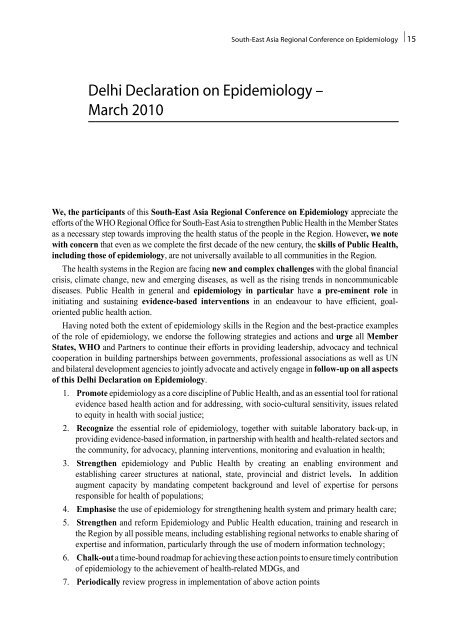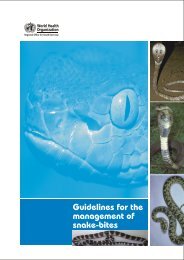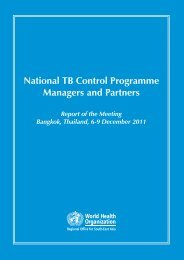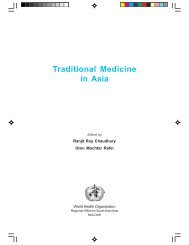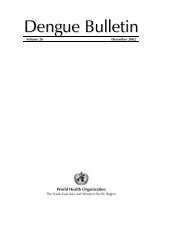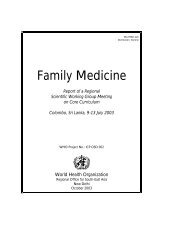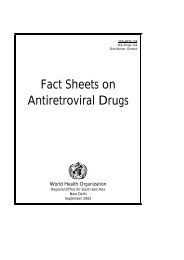South-East Asia Regional Conference on Epidemiology
South-East Asia Regional Conference on Epidemiology
South-East Asia Regional Conference on Epidemiology
Create successful ePaper yourself
Turn your PDF publications into a flip-book with our unique Google optimized e-Paper software.
Delhi Declarati<strong>on</strong> <strong>on</strong> <strong>Epidemiology</strong> –<br />
March 2010<br />
<str<strong>on</strong>g>South</str<strong>on</strong>g>-<str<strong>on</strong>g>East</str<strong>on</strong>g> <str<strong>on</strong>g>Asia</str<strong>on</strong>g> <str<strong>on</strong>g>Regi<strong>on</strong>al</str<strong>on</strong>g> <str<strong>on</strong>g>C<strong>on</strong>ference</str<strong>on</strong>g> <strong>on</strong> <strong>Epidemiology</strong> | 15<br />
We, the participants of this <str<strong>on</strong>g>South</str<strong>on</strong>g>-<str<strong>on</strong>g>East</str<strong>on</strong>g> <str<strong>on</strong>g>Asia</str<strong>on</strong>g> <str<strong>on</strong>g>Regi<strong>on</strong>al</str<strong>on</strong>g> <str<strong>on</strong>g>C<strong>on</strong>ference</str<strong>on</strong>g> <strong>on</strong> <strong>Epidemiology</strong> appreciate the<br />
efforts of the WHO <str<strong>on</strong>g>Regi<strong>on</strong>al</str<strong>on</strong>g> Office for <str<strong>on</strong>g>South</str<strong>on</strong>g>-<str<strong>on</strong>g>East</str<strong>on</strong>g> <str<strong>on</strong>g>Asia</str<strong>on</strong>g> to strengthen Public Health in the Member States<br />
as a necessary step towards improving the health status of the people in the Regi<strong>on</strong>. However, we note<br />
with c<strong>on</strong>cern that even as we complete the first decade of the new century, the skills of Public Health,<br />
including those of epidemiology, are not universally available to all communities in the Regi<strong>on</strong>.<br />
The health systems in the Regi<strong>on</strong> are facing new and complex challenges with the global financial<br />
crisis, climate change, new and emerging diseases, as well as the rising trends in n<strong>on</strong>communicable<br />
diseases. Public Health in general and epidemiology in particular have a pre-eminent role in<br />
initiating and sustaining evidence-based interventi<strong>on</strong>s in an endeavour to have efficient, goaloriented<br />
public health acti<strong>on</strong>.<br />
Having noted both the extent of epidemiology skills in the Regi<strong>on</strong> and the best-practice examples<br />
of the role of epidemiology, we endorse the following strategies and acti<strong>on</strong>s and urge all Member<br />
States, WHO and Partners to c<strong>on</strong>tinue their efforts in providing leadership, advocacy and technical<br />
cooperati<strong>on</strong> in building partnerships between governments, professi<strong>on</strong>al associati<strong>on</strong>s as well as UN<br />
and bilateral development agencies to jointly advocate and actively engage in follow-up <strong>on</strong> all aspects<br />
of this Delhi Declarati<strong>on</strong> <strong>on</strong> <strong>Epidemiology</strong>.<br />
1. Promote epidemiology as a core discipline of Public Health, and as an essential tool for rati<strong>on</strong>al<br />
evidence based health acti<strong>on</strong> and for addressing, with socio-cultural sensitivity, issues related<br />
to equity in health with social justice;<br />
2. Recognize the essential role of epidemiology, together with suitable laboratory back-up, in<br />
providing evidence-based informati<strong>on</strong>, in partnership with health and health-related sectors and<br />
the community, for advocacy, planning interventi<strong>on</strong>s, m<strong>on</strong>itoring and evaluati<strong>on</strong> in health;<br />
3. Strengthen epidemiology and Public Health by creating an enabling envir<strong>on</strong>ment and<br />
establishing career structures at nati<strong>on</strong>al, state, provincial and district levels. In additi<strong>on</strong><br />
augment capacity by mandating competent background and level of expertise for pers<strong>on</strong>s<br />
resp<strong>on</strong>sible for health of populati<strong>on</strong>s;<br />
4. Emphasise the use of epidemiology for strengthening health system and primary health care;<br />
5. Strengthen and reform <strong>Epidemiology</strong> and Public Health educati<strong>on</strong>, training and research in<br />
the Regi<strong>on</strong> by all possible means, including establishing regi<strong>on</strong>al networks to enable sharing of<br />
expertise and informati<strong>on</strong>, particularly through the use of modern informati<strong>on</strong> technology;<br />
6. Chalk-out a time-bound roadmap for achieving these acti<strong>on</strong> points to ensure timely c<strong>on</strong>tributi<strong>on</strong><br />
of epidemiology to the achievement of health-related MDGs, and<br />
7. Periodically review progress in implementati<strong>on</strong> of above acti<strong>on</strong> points


